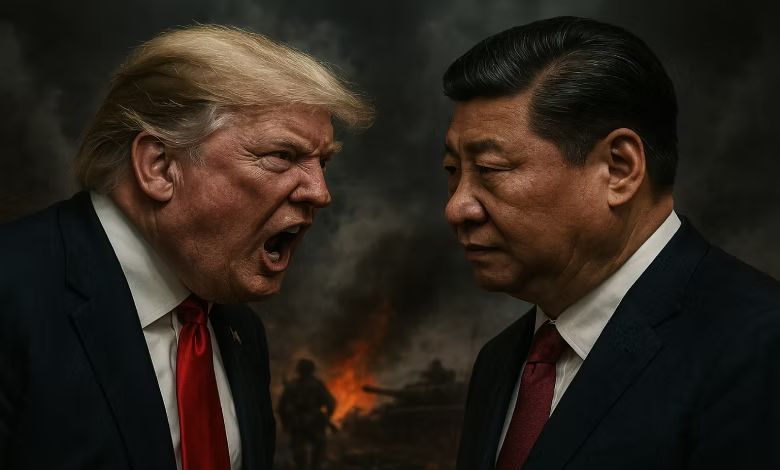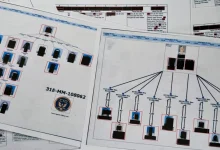Trump Escalates Trade War: China Faces 145% Total Tariffs Amid Global Tensions

WASHINGTON: President Donald Trump has ramped up tariffs on Chinese imports, pushing the total levy on most products to a staggering 145%, the White House confirmed Thursday. The move marks a dramatic intensification of trade tensions between the world’s two largest economies.
On Wednesday, Trump temporarily suspended new tariffs on several countries for 90 days. However, China saw no such reprieve. Instead, the administration imposed an additional 125% tariff on Chinese goods, adding to an earlier 20% duty introduced this year due to alleged Chinese involvement in the fentanyl trade. Combined, these bring the total US-imposed tariff rate on Chinese products to 145%.
During a cabinet meeting, Trump defended the aggressive trade stance, stating that the country was “in very good shape” and seeking fairer treatment globally. “We’re very, very happy with the way the country’s running,” he said.
Treasury Secretary Scott Bessent echoed the president’s tone, calling the new tariffs a strategic effort to isolate China while fostering international cooperation. “Do not retaliate, and you will be rewarded,” Bessent advised other nations.
Also read: China Seeks Allies as US Tariff War With Beijing Escalates
China, meanwhile, is attempting to build alliances in response to Washington’s growing pressure. But these efforts have met with limited success so far. Despite reaching out to other nations, many remain hesitant to align with Beijing in this intensifying trade standoff.
Beijing has rejected US calls for negotiation, vowing to “fight to the end” in the ongoing tariff dispute. In retaliation, China has slapped 84% tariffs on American goods, effective Thursday.
CHINA TURNS TO EUROPE AND ASIA FOR SUPPORT
China’s diplomatic response has focused on strengthening ties with Europe and Southeast Asia. According to Xinhua News Agency, Chinese Premier Li Qiang held talks with European Commission President Ursula von der Leyen, delivering what state media described as a “positive message to the outside world.”
“China is willing to work with the EU to implement the consensus reached by leaders, enhance communication, and deepen cooperation in trade, investment, and industry,” Xinhua reported.
Chinese Foreign Minister Wang Yi has also been in talks with members of the Association of Southeast Asian Nations (ASEAN), while Premier Li met business leaders to signal China’s preparedness. “We’ve fully evaluated the situation and are ready for all uncertainties,” Xinhua quoted Li.
According to the US Commerce Department, China exported $463 billion worth of goods and services to the United States in 2024, ranking behind Mexico and Canada. Conversely, US exports to China hit a record $199 billion. Leading American exports included soybeans, aircraft, pharmaceuticals, and semiconductors, while imports from China primarily consisted of mobile phones, computers, toys, and clothing.
MARKETS REEL AS POLICY FLIP FLOPS ADD TO VOLATILITY
Markets reacted wildly to the US administration’s shifting trade policies. The temporary tariff pause for other nations spurred a brief rally, with the S&P 500 jumping 9.5% on Wednesday—its best day since 2008. Europe’s STOXX index also surged in its strongest rally since March 2020. Analysts dubbed the move a “Trump Blink.”
Also read: Indian Market: Will Sensex, Nifty Start Higher Today After 90-Day Tariff Freeze?
Yet the relief was short-lived. The Hang Seng Index in Hong Kong had already suffered a 13% plunge earlier in the week—its worst since 1997. Likewise, the S&P 500 and STOXX 600 logged their sharpest three-day falls since the pandemic began.
“This level of market volatility hasn’t been seen since the global financial crisis,” said George Lagarias, chief economist at Forvis Mazars. “It’s destabilizing for global finance.”
By Thursday, sentiment soured once more. The S&P 500 dropped over 3%, gold prices hit an all-time high, and the US dollar slumped to a decade-low against the Swiss franc. Treasury yields dipped as investors sought safe-haven assets, with a strong bond auction offering a rare moment of calm.
With the US-China trade conflict deepening, analysts warn of broader economic implications. While US inflation data showed a surprise dip in March, it offered little comfort as Wall Street braces for the upcoming corporate earnings season, beginning with major banks like JPMorgan Chase.




